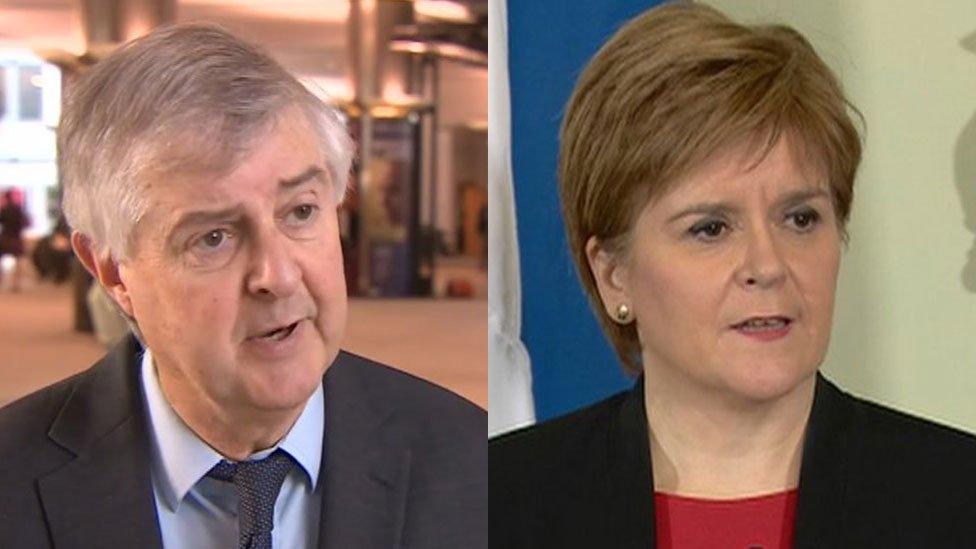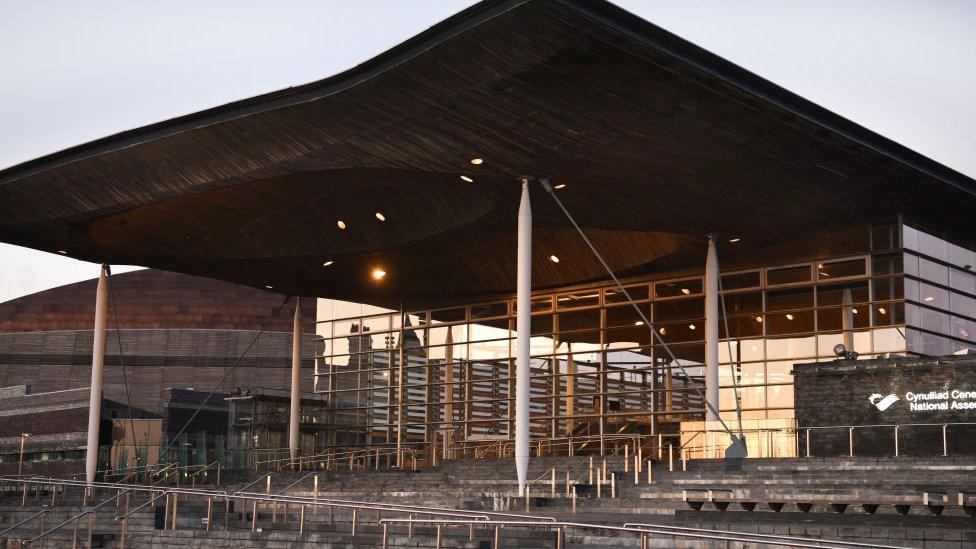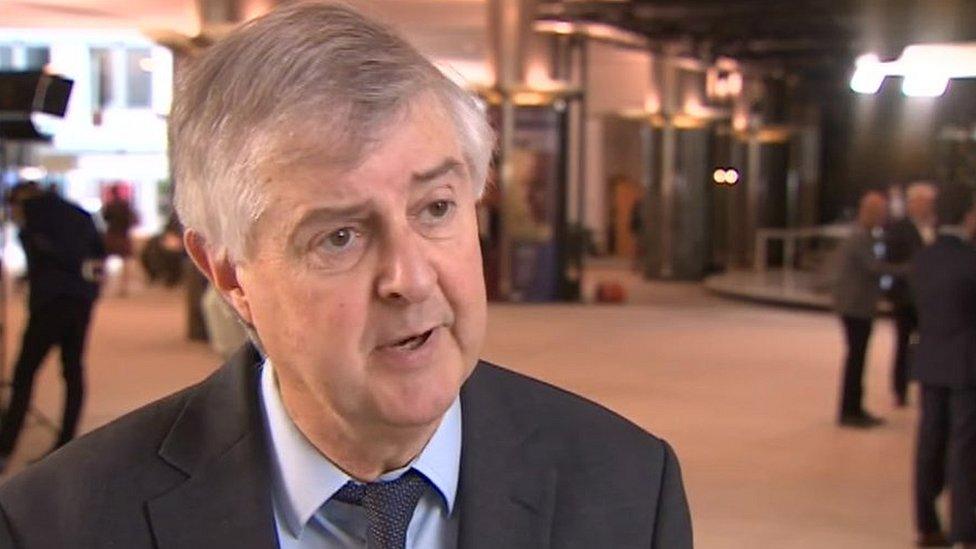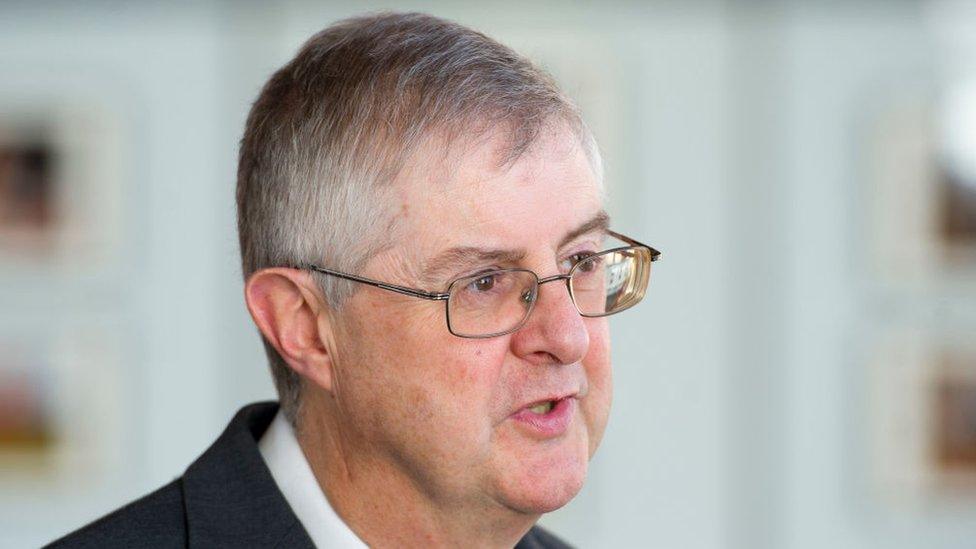Brexit: First ministers call for next PM to reject no deal
- Published
- comments

The Welsh and Scottish first ministers have said a no-deal Brexit would be "disastrous"
The Welsh and Scottish governments have said they will work together to try to keep the UK in the European Union.
Mark Drakeford and Nicola Sturgeon also called on the next prime minister to "change course and rule out" leaving the EU without a deal.
The first ministers are becoming "increasingly alarmed" by "hard-line rhetoric about a no-deal Brexit".
The joint statement was released ahead of a meeting of the British-Irish Council (BIC) in Manchester on Friday.
The UK government's de facto Deputy Prime Minister David Lidington and the Irish PM Leo Varadkar also attended the meeting.
Mr Varadkar warned that leaving without a deal would have a "very severe impact" on trade between Holyhead and Dublin ports.
Welsh First Minister Mr Drakeford met Mr Lidington for a one-on-one meeting on Thursday night and held talks with Scottish First Minister Ms Sturgeon on Friday morning ahead of the BIC event.
'Crash out'
In a statement, the first ministers raised concern about the possibility of the UK leaving the EU without a deal at the end of the current negotiating period on 31 October.
Mr Drakeford and Ms Sturgeon said: "We believe leaving the EU without a deal would be disastrous for the economies within these islands and for the livelihoods of hundreds of thousands of people."
"The next prime minister must pull back from the brink of a 'no-deal' Brexit and be honest with the public.
"If they continue on their current path, the UK looks increasingly likely to crash out of the EU in just four months' time."
Boris Johnson, the leading candidate in the contest to replace Theresa May as Conservative leader and prime minister, has said the UK must leave the EU on 31 October "deal or no deal", but claimed the chances of a no-deal Brexit happening were a "million to one".
His opponent Jeremy Hunt has said the UK "will leave without a deal" if there was no prospect of reaching an agreement by October.
One of the two contenders will be named winner of the Tory leadership race on 23 July aftera ballot of party members.
Following an awful set of results for Labour in the European elections in May, the Labour-led Welsh Government announced a change of policy to fully back a new referendum.
Speaking at the BIC meeting, Mr Drakeford said it would be "democratically absurd" if the UK were to leave the EU without a deal based on a "tiny electorate inside the Conservative Party".
"So, if it does come to a no-deal Brexit then that can only be legitimized by either general election or a referendum," he said.
"That's very important for our democracy, to have it endorsed or rejected," he added.
Mr Drakeford said hoped the Labour Party nationally "will be in the same position as we are in".
However, he accepted that he had to be "understanding of the process that we [Labour] have to go through in order to get there".
The SNP-led Scottish Government has long been supportive of a further referendum, and in their joint statement the Welsh and Scottish first ministers said they would work together in an attempt to force another vote.
'Impose tariffs'
Irish PM Mr Varadkar told journalists at the BIC press conference that he hoped to avoid a no-deal Brexit,
"I think in the event of a no-deal Brexit there will be a very severe impact on trade between Dublin and Holyhead," he said.
"In the first instance we'll have to impose tariffs on all goods being imported in to Ireland from the UK and we'd have to put in place the necessary customs checks and controls.
"We have the infrastructure in place now in Dublin port and the staff to do that and we really don't want to do it," he added.
Around 70% of Irish cargo destined for UK and EU markets passes through Welsh ports.
For the UK government, Mr Lidington said: "I've been very clear in my mind that a no-deal Brexit would be harmful to manufacturers and to agriculture in Wales and to the whole of the United Kingdom.
"No deal is something we should be striving to avoid.
"Much better that we acknowledge and respect the referendum result in Wales and the United Kingdom as a whole but we do so through an orderly departure," he added.
- Published5 March 2019

- Published26 June 2019

- Published27 May 2019
